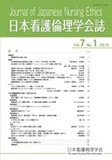Japanese
English
- 販売していません
- Abstract 文献概要
- 参考文献 Reference
- サイト内被引用 Cited by
これまで末期医療に関する代理意志決定については、家族の代理意志決定への支援の視点からの研究はなされてきたが、心理的な影響についての分析・解釈はWendlerらの研究を嚆矢とする。しかしこれも統計的分析に限られており、個別の事例に着目した研究はほとんど行われていない。そこで本研究においては「末期の重度認知症患者への人工的水分・栄養補給(AHN)の導入の可否」という具体的なケースを解釈学的な視点で読み解き、その決定に影響を与える要因を分析・解釈することで、代理意思決定の妥当性を検証する可能性を考察した。その際には家族間の会話だけでなくノンバーバルな交流をも会話分析で記録し、各人の物語(ナラティブ)の心理的・社会的要因を分析・解釈することで、代理意志決定に影響を与える諸要因を考察した。それに基づき当事者家族間における代理意志決定における物語の共有を調停・促進(ファシリテーション)することでよりふさわしい決定をなし得ると考えられる。
With regard to family surrogate decision-making about terminal care, several studies have been conducted on “how to assist family surrogates in their decision-making.” However, there were few studies targeting surrogate decision-making itself prior to David Wendler et al.'s investigation encompassing “The Effect on Surrogates of Making Treatment Decisions for Others.” Still, this study was limited to statistical analyses, and there have been only a few studies focusing on individual cases. Therefore, the present study took a hermeneutic approach to dissecting individual cases and examining a methodology for analyzing psychological factors that influence decision-making in such cases. The possibility of facilitating agency decision-making was discussed. Specifically, we focused on family surrogate decision-making regarding “whether or not to administer artificial hydration and nutrition to a patient (AHN) with end-stage, severe dementia” and recorded all communications among family members, including non-verbal interactions, in order to perform conversation analyses. Through interpreting psychological and social factors affecting each family member, we were able to examine and analyze various factors that influence surrogate decisionmaking. Furthermore when a family shares the narrative for “surrogate decision-making”, we concluded that they can make a more suitable decision.
Copyright © 2015, The Japan Nursing Ethics Associatin. All rights reserved.


